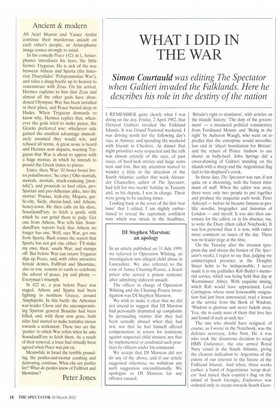Ancient & modern
AS Ariel Sharon and Yasser Arafat continue their murderous assault on each other's people, an Aristophanic image comes strongly to mind.
In his comedy Peace (421 BO, Aristophanes introduces his hero, the little farmer Trygaeus. He is sick of the war between Athens and Sparta (the historian Thucydides' 'Peloponnesian War'), and rides a dung-beetle up to heaven to remonstrate with Zeus. On his arrival, Hermes explains to him that Zeus and almost all the other gods have abandoned Olympus; War has been installed in their place, and Peace buried deep in Hades. When Trygaeus demands to know why, Hermes replies that, whenever the gods tried to make peace, the Greeks preferred war: whichever side gained the smallest advantage immediately assumed they would win, and refused all terms. A great noise is heard and Hermes now departs, warning Trygaeus that War is about to appear with a huge mortar, in which he intends to pound the Greek states to pieces.
Enter, then, War: 'To brotoi brotoi brotoi poludemones,' he cries ('Oho mortals, mortals, mortals, much-enduring [mortalsr), and proceeds to hurl cities, proSpartan and pro-Athenian alike, into the mortar: Prasiae, leek-city, Megara, garlic-city, Sicily, cheese-land, and Athens, honey-town. He then calls on his slave, SoundandFury, to fetch a pestle with which he can grind them to pulp. Get one from Athens, War tells him. SoundandFury reports back that Athens no longer has one. Well, says War, get one from Sparta. Back comes the report that Sparta has not got one either. 'I'll make my own, then,' snarls War, and stumps off. But before War can return Trygaeus digs up Peace, and, with other attractive female deities, Fullfruit and Showtime, also in tow, returns to earth to celebrate the advent of peace, joy and plenty — Everyman's triumph.
In 422 BC, a year before Peace was staged, Athens and Sparta had been fighting in northern Greece, around Amphipolis. In this battle the Athenian war-leader Cleon and the uncompromising Spartan general Brasidas had been killed, and, with them now gone, both sides had started to make tentative moves towards a settlement. These two are the 'pestles' to which War refers when he asks SoundandFury to fetch them. As a result of their removal, a truce had virtually been agreed when Peace was put on.
Meanwhile in Israel the tem'ble pounding, the pestles-and-mortar crushing and destroying, continue. What else are pestles for? What do pestles know of Fullfruit and
Showtime? Peter Jones


































































 Previous page
Previous page